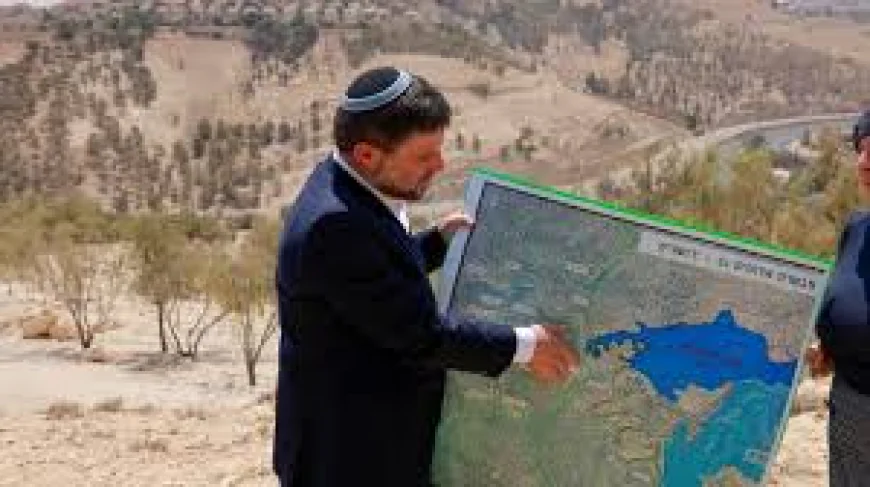From West Bank to Gaza: How Smotrich’s Agenda Fuels Global Conflict
Israel’s finance minister Bezalel Smotrich is aggressively pushing forward with expansion and legalization of Jewish settlements across the occupied West Bank. This move directly undermines international efforts to recognize a Palestinian state and further entrenches Israeli control over contested territory. It signals that the current Israeli leadership is not only ignoring global pressure for a two-state solution, but intentionally cementing a one-state reality controlled by Israel. The policy also deeply affects the Israel-Gaza conflict by motivating hardliners, weakening moderates on both sides, and inflaming global public opinion. By prioritizing settlement growth, Israel risks escalating violence, international isolation and complicates any future peace negotiation.

Israel's Push for West Bank Settlements: What Smotrich’s Plan Means for Palestine and the Global Narrative
Israel’s far-right finance minister, Bezalel Smotrich, has made no secret of his intention to accelerate settlement building in the West Bank; a territory Palestinians see as the heart of a future independent state. His plan involves legalizing dozens of unauthorized outposts, approving thousands of new settler homes, and imposing more direct Israeli civil governance over parts of the region that have historically been under military control.
This agenda stands in sharp opposition to the decades-old global consensus around a two-state solution, which envisions an independent Palestinian state alongside Israel. The world's political narrative, from the United Nations to the European Union and many Arab and Western governments, still claims to support the idea of Palestine achieving statehood within the West Bank, Gaza, and East Jerusalem.
However, Smotrich and other ideologically driven members of the current Israeli government believe all of historic Israel, including Judea and Samaria (the biblical names for the West Bank), belongs solely to the Jewish people. For them, settlement expansion is not merely a policy but a religious and national mission. Smotrich's actions aim to create irreversible facts on the ground: that the West Bank will remain under permanent Israeli sovereignty, regardless of international objections.
Implications for the Palestinian Statehood Agenda
This hardline direction weakens any possibility of establishing a contiguous Palestinian state. As settlements multiply and expand, Palestinian territories become fragmented, broken into disconnected enclaves surrounded by Israeli roads and military zones. Even moderate Palestinians lose faith in diplomacy when Israeli policies appear designed to eliminate the very land base for a future state. Meanwhile, Arab nations that normalized ties with Israel under the Abraham Accords face growing internal pressure from their populations accusing them of abandoning the Palestinian cause.
If Israel formally annexes parts of the West Bank, the idea of a viable Palestinian state becomes nearly impossible. This would render international talks about statehood nothing more than symbolic gestures, fueling anger across the Middle East and feeding extremist narratives that the peace process is a sham.
How It Ties into the Israel–Gaza War
This settlement strategy is also linked to the ongoing war in Gaza. Many members of Israel’s governing coalition argue that defeating Hamas in Gaza must be accompanied by strengthening Jewish control in the West Bank to prevent a future Palestinian uprising there. In reality, the settlement expansion fuels resentment and may encourage further radicalization in the West Bank, potentially opening a second front in the conflict.
For Palestinians, whether in Gaza or the West Bank, Israel’s settlement push is seen as part of the same oppressive policy. The humanitarian crisis in Gaza, the destruction of homes, and the settlement of land in the West Bank are viewed as part of a broader strategy of displacement. This perception helps Hamas and other militant groups justify their resistance and maintain local support amid the war.
International Consequences
Global powers continue to issue statements condemning the settlements, but in practice, little has been done to stop them. Western support for Israel, especially from the United States, has become more controversial as images of war devastation in Gaza spread across global media. Smotrich’s settlement drive will likely increase diplomatic tensions with Europe and weaken Israel’s ties with countries in the Global South, many of whom already accuse Israel of colonialism and apartheid.
Even within Israel, security officials have warned that unchecked settlement expansion could trigger violent outbreaks, requiring more military presence and dividing Israeli society further. Economically, prolonged conflict and diplomatic isolation could harm Israel’s trade and technology partnerships.


